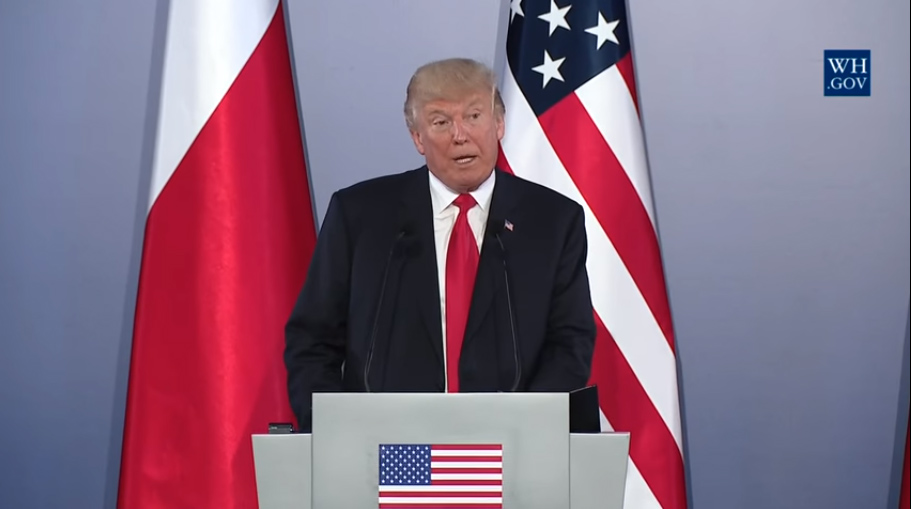 President Trump Speaking in Poland
President Trump Speaking in Poland
Five Things Trump Needs to Discuss with Putin
“Wouldn’t it be great if we actually got along with Russia?” Then-candidate Donald Trump asked this question many times during the 2016 campaign. Few would disagree. The world would benefit from more cooperation between the United States and Russia. Yet despite several attempts at “resets,” there are a number of areas where the U.S. and Russia simply have opposing interests. White House staff have indicated that the president does not have a specific agenda for Friday’s meeting with Putin. This is problematic, given the current state of the U.S.-Russia relationship, and the prospect of future negotiations. While this first official meeting between Trump and Putin will probably not produce any major changes of policy, it will be an opportune time to stake out the U.S. position on several key issues.
1.) Support for NATO
President Trump has publicly criticized America’s NATO allies as not contributing their “fair share” to the alliance. There is valid criticism about the defense spending of a number of NATO countries, but this criticism should be private. Continued wavering by the president over the U.S. commitment to NATO weakens the alliance in the face of a determined adversary like Putin. President Trump should clearly reaffirm the U.S. commitment to the collective defense mechanism of Article 5 directly to Putin. There must be no doubt the U.S. will come to the aid of its allies in the face of Russian aggression, as they came to the aid of the U.S. after 9/11.
2.) Ukraine
The three-year conflict in Ukraine is a model for potential Russian military interference in other European countries. Trump should affirm American support for a sovereign Ukraine, and discuss increasing U.S. assistance to the country. Putin needs to know that Russian actions have consequences. Increasing the lethality and competence of the Ukrainian military will have direct consequences for Russia. America’s ability to independently change the situation on the ground is limited, but Putin needs to feel greater pressure. Putin should know that a combined effort by the U.S. and European allies, along with a more effective Ukrainian government and military, is capable of exerting enough pressure to change Russia’s course.
3.) Syria
Right now, Syria is where U.S. and Russian forces are most likely to clash. U.S. and Russian strategic interests in Syria are diametrically opposed. The U.S. has recently begun targeting Syrian Government air assets attacking rebel forces, and Russia has withdrawn its public support for the “deconfliction line” intended to prevent mishaps between coalition and Russian aircraft (though the line still remains active). President Trump needs to make it clear to Putin that the U.S. will defend its assets and allies in Syria, and that Russian forces would be well-advised to stay clear of declared zones of control.
4.) Nuclear Non-Proliferation
Nuclear weapons remain the greatest security threat to the U.S. and Russia: a threat which is existential in nature. The New START treaty, signed in 2010, is a good deal for the United States and Russia, with inspection mechanisms that allow both countries to reduce the risk of nuclear war, while reducing the number of deployed nuclear weapons. But like the nuclear arms treaties that came before, New START has an expiration date, and that will come during a potential Trump second term. It is in the interest of the United States to either extend this treaty, or negotiate a new treaty which presses for further reductions of both nuclear arsenals. Additionally, Russian violation of the Intermediate-Range Nuclear Forces (INF) Treaty by deploying ground-launched cruise missiles should not go unaddressed, and President Trump should press Putin hard on this issue. The U.S. and Russia have worked cooperatively on non-proliferation issues around the world, and continued cooperation may prove helpful in dealing with third parties like North Korea.
5.) Military Harassment at sea and in the air
The behavior of the Russian military at sea and in the air has flaunted international norms. It is provocative and risks the safety of everyone involved. Dangerous behavior including airspace violations, unsafe intercepts by aircraft, and the harassment of ships at sea, could turn deadly. President Trump should confront Putin about this behavior, and push for the professional conduct of military forces to prevent an accident or escalation that neither country truly wants.
Whatever the outcome of this bilateral meeting, it’s clear this is an important opportunity for the Trump Administration to set the stage for the American relationship with Russia going forward. The president must assert America’s interest at this meeting, and not talk to Putin without having a specific agenda.





